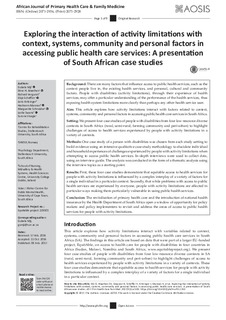| dc.contributor.author | Mji, Gubela | |
| dc.contributor.author | Braathen, Stine Hellum | |
| dc.contributor.author | Vergunst, Richard | |
| dc.contributor.author | Scheffler, Elsje | |
| dc.contributor.author | Kritzinger, Janis | |
| dc.contributor.author | Mannan, Hasheem | |
| dc.contributor.author | Schneider, Marguerite | |
| dc.contributor.author | Swartz, Leslie | |
| dc.contributor.author | Visagie, Surona | |
| dc.date.accessioned | 2019-02-28T12:54:33Z | |
| dc.date.available | 2019-02-28T12:54:33Z | |
| dc.date.created | 2017-02-09T15:03:33Z | |
| dc.date.issued | 2017 | |
| dc.identifier.citation | African Journal of Primary Health Care & Family Medicine. 2017, 9 (1), pp 9 | nb_NO |
| dc.identifier.issn | 2071-2928 | |
| dc.identifier.uri | http://hdl.handle.net/11250/2588070 | |
| dc.description.abstract | Background: There are many factors that influence access to public health services, such as the context people live in, the existing health services, and personal, cultural and community factors. People with disabilities (activity limitations), through their experience of health services, may offer a particular understanding of the performance of the health services, thus exposing health system limitations more clearly than perhaps any other health service user. Aim: This article explores how activity limitations interact with factors related to context, systems, community and personal factors in accessing public health care services in South Africa. Setting: We present four case studies of people with disabilities from four low-resource diverse contexts in South Africa (rural, semi-rural, farming community and peri-urban) to highlight challenges of access to health services experienced by people with activity limitations in a variety of contexts. Methods: One case study of a person with disabilities was chosen from each study setting to build evidence using an intensive qualitative case study methodology to elucidate individual and household experiences of challenges experienced by people with activity limitations when attempting to access public health services. In-depth interviews were used to collect data, using an interview guide. The analysis was conducted in the form of a thematic analysis using the interview topics as a starting point. Results: First, these four case studies demonstrate that equitable access to health services for people with activity limitations is influenced by a complex interplay of a variety of factors for a single individual in a particular context. Secondly, that while problems with access to public health services are experienced by everyone, people with activity limitations are affected in particular ways making them particularly vulnerable in using public health services. Conclusion: The revitalisation of primary health care and the introduction of national health insurance by the Health Department of South Africa open a window of opportunity for policy makers and policy implementers to revisit and address the areas of access to public health services for people with activity limitations. | nb_NO |
| dc.language.iso | eng | nb_NO |
| dc.relation.uri | http://www.phcfm.org/index.php/phcfm/article/viewFile/1166/pdf_1 | |
| dc.rights | Navngivelse 4.0 Internasjonal | * |
| dc.rights.uri | http://creativecommons.org/licenses/by/4.0/deed.no | * |
| dc.title | Exploring the interaction of activity limitations with context, systems, community and personal factors in accessing public health care services: A presentation of South African case studies | nb_NO |
| dc.type | Journal article | nb_NO |
| dc.type | Peer reviewed | nb_NO |
| dc.description.version | publishedVersion | nb_NO |
| dc.source.pagenumber | 9 | nb_NO |
| dc.source.volume | 9 | nb_NO |
| dc.source.journal | African Journal of Primary Health Care & Family Medicine | nb_NO |
| dc.source.issue | 1 | nb_NO |
| dc.identifier.doi | 10.4102/phcfm.v9i1.1166 | |
| dc.identifier.cristin | 1448976 | |
| cristin.unitcode | 7401,60,25,0 | |
| cristin.unitname | Helse | |
| cristin.ispublished | true | |
| cristin.fulltext | original | |
| cristin.qualitycode | 1 | |

